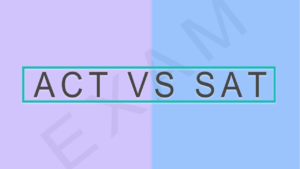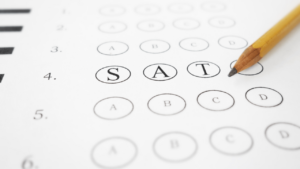Most students giving the SAT are scared of the Math section, but unlike popular belief, the SAT Math section isn’t exceedingly different if one has extensively prepared for it. So once an individual understands how the math tricks work, the easier it becomes for them to perform well on the test day.
In order to help students with the SAT Math section, we’ve created a comprehensive guide. This blog will be exponentially beneficial for applicants dedicated to doing well on the SATs by committing their time and energy. Keep reading for the vital topics, difficulty levels, and preparation tips for the SAT Math test.
Leap Advantage Virtual Spot Offer Event on May 10th 2024

Last call to secure your spot for Masters in STEM Program in the US for Fall ’24 exclusively for graduates and above.
Leap Advantage Virtual Spot Offer Event on May 10th 2024
Last call to secure your spot for Masters in STEM Program in the US for Fall ’24 exclusively for graduates and above.

Overview of SAT Math Exam
A total of 58 questions need to be answered in the SAT mathematics section. These questions assess the student’s understanding of mathematical concepts, their ability to apply these concepts, and their procedural skill and fluency in math. Instead of testing candidates on every math topic, the SAT Math test focuses on the topics one is likely to encounter in their career or college. Plus, the SAT Maths test is divided into two sub-sections. The first one is the Math no-calculator, while the other is the Math calculator. Students get a total of 80 minutes for the SAT Math diagnostic test.
SAT Math Topics
While there are various topics that students are required to prepare for, here are some vital topics for the SAT Math exam.
Algebra
It focuses on linear equations and functions found in various fields of study. It is a vital topic, and one can expect around 19 questions from this section. The questions under this sub-head require students to create equations representing a situation. Afterwards, they need to solve equations and systems of exponents, linear equations, polynomials, and exponential growth to make connections between different representations of linear relationships.
Problem-solving & Data Analysis
This section of questions includes using ratios, percentages, probability, and proportional reasoning to solve real-world situations in contexts like science and social science. It also includes describing relationships shown through graphs and analysing data through statistics. This set of skills is all about being quantitatively literate. The SAT Math can have around 16-17 questions on this topic. Plus, these areas provide a strong foundation for the math you will do in the future.
Advanced Math
The third focus area in the SAT Math test is advanced math. The problems in this area focus on the math you will need to pursue higher studies in disciplines like economics and science. It requires students to be familiar with more complex functions or equations that will prepare them for advanced courses in statistics and calculus. This topic contains around 16 questions in the SAT Math section.
Additional Topics in SAT Math
Apart from the key topics mentioned above, there are some additional topics in SAT Math. These include coordinate geometry, complex numbers, and trigonometry. Students can expect around five to six questions on these topics. These questions focus on the following:
- Solving problems from the volume and area of figures.
- Finding sums from the right angles, trigonometric functions, and the unit circle.
- Solving theorems and definitions related to problems from right triangles, lines, circles, polygons, and angles.
Score Calculator for SAT MAT Test
As mentioned above, the SAT Math exam is divided into two sub-sections. One is with the calculator, while the other is without it. Generally, the questions in the calculator part are more complex. Conversely, questions in the no-calculator section emphasise your ability to do problems accurately and efficiently. The score of SAT Math is calculated on a scale of 200-800. Students get one mark for every correct answer. The deduction of a wrong answer differs on the number of options provided in the question. For instance, 1/4th of points are educated for wrong answers with five options and 1/3 for a four-choice question.
SAT Math Difficulty
The difficulty of each competitive exam depends from individual to individual. The case isn’t much different with the SAT, especially the SAT Math section. However, if one has studied math in high school and has an in-depth understanding of the concepts, the test shouldn’t be difficult for them. The word problems and trigonometry aren’t unlike the kind one must’ve seen in their classes. Although, some algebra questions can be tricky. So, students who aren’t strong in this topic must prepare accordingly. The complexity level of the SAT exam maths ranges from 9th standard to early post-secondary.
SAT Math Test Preparation Tips
In order to make the preparation for SAT Math easier for students, we’ve curated a list of SAT prep tips. These will help individuals ace the test.
- Practise as many practice questions as possible from the previous year’s SAT Maths test papers.
- In order to develop one’s skills to solve tough questions, engaging in the Maths calculator section is a must.
- Always take a practice test paired with an answer sheet.
- Reviewing weak points and working on them is essential for growth.
- Students must memorise the strategies and formulas while practising for the exam. Strategies like backsolving and picking numbers can be immensely beneficial.
- Emphasise time management while practising by keeping a watch nearby.
- Use flashcards for revision before the Math exam.
- As time is limited in this test, students must learn to perform basic calculations to save time. It includes basic multiplication and one involving numerator-denominator.
Conclusion
The SAT Math section is designed to test students’ ability to solve mathematical problems, interpret data, and reason quantitatively to the problems presented, among other math skills. The areas of mathematics covered under the SAT include Algebra, Geometry, Data Analysis, Arithmetic, and Functions. Students have to solve a total of 58 questions in 80 minutes. The test is divided into two sub-sections. While the non-calculator section goes on for 25 minutes with 15 math questions, the calculator consists of 38 questions (30 multiple choice questions and eight grid-ins) that need to be answered in 55 minutes. The difficulty level in the SAT Math lies somewhere from 9th standard to post-secondary complexity. The list of vital topics and preparation tips mentioned in this blog can help students from India prepare for the Scholastic aptitude test Maths section extensively. For further information, book a free counselling session on LeapScholar today.
Frequently Asked Questions
What topics does the SAT Math no-calculator include?
The no-calculator requires individuals to answer 15 questions in 25 minutes. The topics focused in this section include algebra, geometry, and passport to advanced math.
What is considered a good score on the SAT Maths exam?
The score of SAT Math is calculated on a scale of 200-800. A score above 600 is considered a good score.
What types of questions can one expect in the no-calculator section of SAT Math?
Questions in the no-calculator section are generally more conceptual in nature and don’t require a calculator to be solved.
How can students ace their SAT maths exam?
In order to ace their SAT Math, students must prepare well. Finding out one’s weakness and working on it is foremost. Choosing SAT practice tests and resources wisely and monitoring time while practising also helps immensely. While giving the test, students should answer the questions that they know first and try to answer every question on the test.







